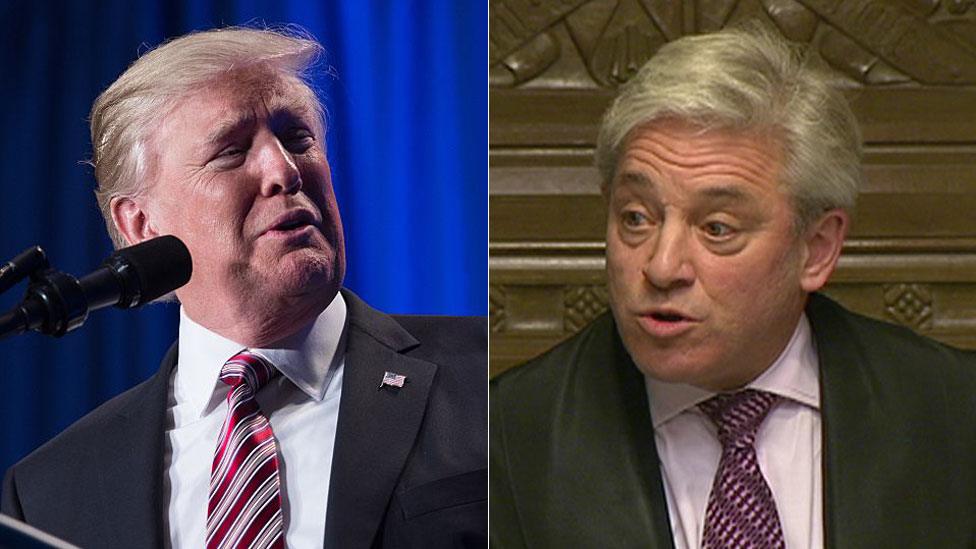The week ahead in Parliament: Brexit bill and Trump debate
- Published
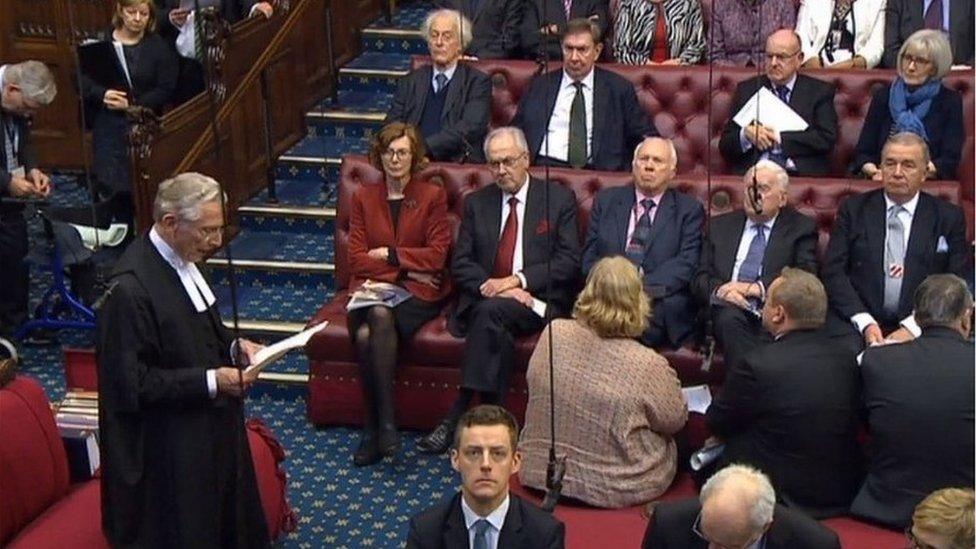
The House of Lords will get its teeth into the Article 50 bill on leaving the EU
After half term week, it's back to Brexit, as the Article 50 Bill hits the House of Lords for a two day debate, with all the trimmings.
It's got diplomats, generals, bishops, former foreign secretaries, savants, super-lawyers, mandarins, ex-chancellors, immigration campaigners, authors, business folk, and even ex-policemen.
I can predict with confidence that, by tea-time on Monday, everything will have been said, although in the best House of Lords tradition, not everyone will have (yet) said it.
It seems unlikely that the debate will even end in a recorded vote.
The House of Lords normally gives an unopposed Second Reading to government legislation, so it would be a breach of tradition (which is a very big deal on the Red Benches) to force a division - and the only motive would be to record the individual votes, because a thumping majority for the Bill would be the certain result.
Incidentally, with 191 peers down to speak at the moment, the total tops the previous record of 182 who joined the list to speak on the 1999 House of Lords Bill (Hat-tip to Matthew Purvis, Head of Research at the Lords Library).
So what is to be learned from the debate? Watch the crossbenchers. The crossbench or independent peers are not a party - they have no agreed policies, still less a whip, and their main rule is that their members must carry no taint of party allegiance, which means no local membership, and no financial donations.
It follows that there is no crossbench line on Brexit, but the crossbenchers could well provide the swing vote on the key amendments to be debated at the bill's committee stage, a week after Second Reading.
So any indication that they are breaking in a particular direction will be significant. One key figure may be the super-lawyer, Lord Pannick, who led the legal team which forced the Government to introduce this Bill in the first place.
In debates on legal issues, in particular, he has been able to persuade the Lords' legion of retired judges and senior QCs to back his initiatives, and his name appears on an amendment from Labour's shadow Brexit spokesperson, Baroness Hayter, requiring prior Parliamentary approval for agreements with the European Union, which bears a considerable resemblance to the "Meaningful Vote" proposed by Labour in the Commons.
The "Meaningful Vote" looks likely to provide the toughest test for the government whips, although the issue of the status of EU citizens resident in the UK will also be raised - and here the support for the amendment from the Joint Committee on Human Rights could be important.
So the two days next week will provide an opportunity for sensitive antennae to gauge the mood in the Chamber - will peers feel they have no right to meddle with a bill which gives expression to the referendum verdict?
Will those who're tempted to tamper be frightened off by menacing rumblings about abolishing them? Will they dismiss the warnings - or will some decide that if there is any cause worth risking their status for, the EU is it?
Meanwhile this week should also see the final flourish of HS2, and some interesting manoeuvres around the campaign to crack down on international human rights abusers and a chance for (English) MPs to complain about the funding for their police and local councils.

Monday 20th February
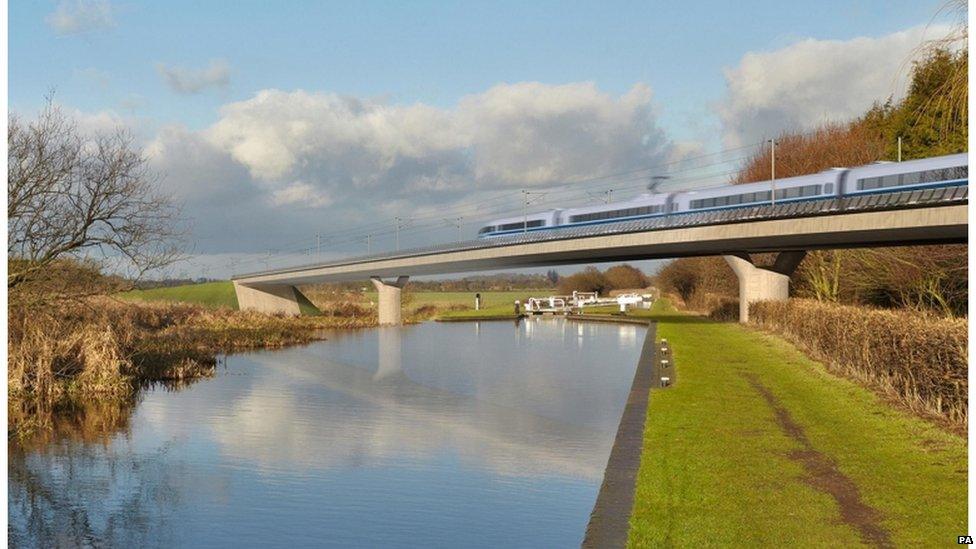
Parliament has been considering legislation on HS2 for four years
The Commons kicks off at 14.30 GMT with Work and Pensions Questions
The main legislating will be on the Report and Third Reading stages of the Cultural Property (Armed Conflicts) Bill which implements the Hague Convention for the Protection of Cultural Property in the Event of Armed Conflict.
The convention was prompted by the widespread destruction and looting of cultural property in the second world war - and has been given new resonance by the destruction of ancient monuments in the Middle East, like the city of Palmyra.
MPs then move on to what will probably be their last rites on the HS2 Bill, or to give it its full title, the High Speed Rail (London - West Midlands) Bill.
They're due to consider Lords amendments - and the changes made in the Lords are pretty detailed tweaks - so unless opponents of the Bill are planning some last minute theatre, this will be the final episode in the marathon four-year process of approving the first phase of HS2.
In Westminster Hall at 16.30 BST MPs debate two e-petitions arguing opposite views of President Trump's proposed state visit to the UK.
Petition 171928 says that "Donald Trump's well documented misogyny and vulgarity disqualifies him from being received by Her Majesty the Queen or the Prince of Wales. Therefore during the term of his presidency Donald Trump should not be invited to the United Kingdom for an official State Visit."
On the other hand, Petition 178844 says: "Donald Trump should be invited to make an official State Visit because he is the leader of a free world and UK is a country that supports free speech and does not believe that people that oppose our point of view should be gagged."
As always on these occasions, there is no vote - although a minister will give the Government response. (Incidentally, the Government petitions website generates maps showing where the signatures come from - take a look; it's fascinating!)
In the Lords, the usual half hour of questions to ministers will be but a brief appetiser for the mammoth Second Reading debate on the EU (Notification of Withdrawal) Bill - which will also encompass most of Tuesday's sitting.

Tuesday 21st February
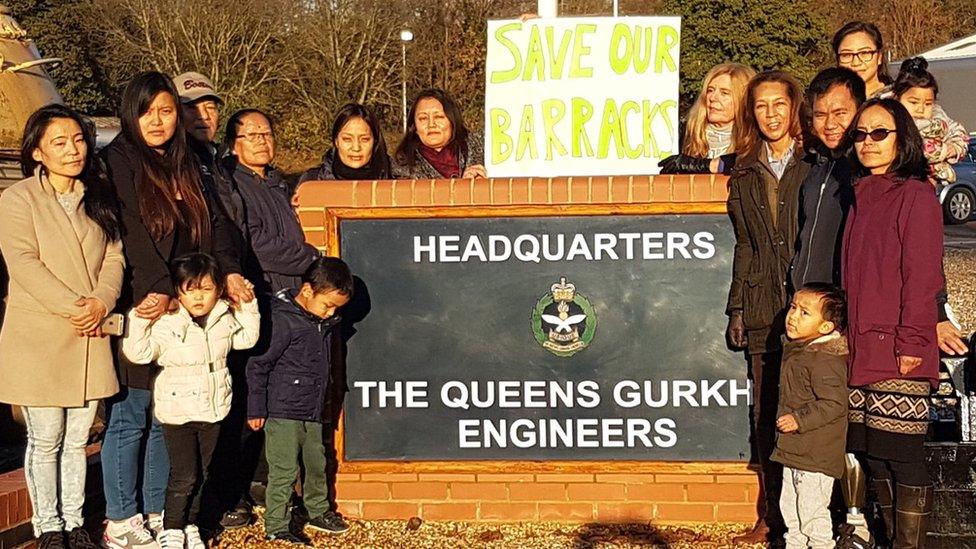
Families of the Queen's Gurkha Engineers have made Maidstone their home
The Commons opens at 11.30 GMT with Foreign Office Questions
The SNP's Chris Stephens has a Ten Minute Rule Bill to end to the premium-rate charges on phone inquiries about benefits, which he calls the "telephone tax".
He says disabled people who use the government hotline to appeal against benefits sanctions are charged more than millionaires calling to query their tax bill, and he wants the Department for Work and Pensions to drop costly 0345 numbers that have seen his constituents paying up to £9 to make an inquiry on their benefits status.
Then MPs turn to the Criminal Finances Bill - which extends the powers of law enforcement agencies to tackle money laundering from the proceeds of tax, evasion, organised crime or for financing terrorism.
The annual amount of money laundered globally amounts to $1.6 trillion, while the National Crime Agency believes many billions of pounds are laundered into or through the UK as a result of international corruption.
Watch out for an "Magnitsky" amendment from the former Justice Minister Dominic Raab, who has assembled impressive cross-party backing for a change in the law to tackle those implicated in gross human rights abuses, such as the murder of Sergei Magnitsky a lawyer who uncovered corruption and tax fraud in Russia, and was killed in prison.
This is a cause Mr Raab has been pursuing for several years - along with his call for a ban on UK visas for those implicated in such crimes.
There's now a competing amendment from the Home Secretary, Amber Rudd, which looks to be an attempt at a compromise on the issue, so look out for some close questioning of ministers on the detail of their amendment.
Then the House will vote on motions to up-rate social security benefits and pensions.
In the adjournment debate, the Conservative former defence minister, Dr Andrew Murrison, marks the centenary of the sinking of the SS Mendi - which claimed the lives of more than 600 South African servicemen whilst travelling from Plymouth to France.
In Westminster Hall, my eye was caught by Helen Grant's debate between 9.30 and 11.00 GMT on a Better Defence Estate Strategy - the Ministry of Defence owns about 1.8% of the UK's land mass; it costs £2.5bn a year to maintain; and 40% of our assets are more than 50 years old.
Given the Armed Forces are 30% smaller than at the end of the last century while the estate has only reduced by 9%, there may be scope to sell some of it off.
The latest plans earmark 91 of the most expensive sites for disposal, with the thought that this will make an important contribution to the government's target to release land for 55,000 homes. This could attract considerable interest from MPs whose constituencies include some of the land in question.
Helen Grant's main focus will be on the decision to close Invicta Park Barracks, in her Maidstone constituency, and in particular on the Queen's Gurkha Engineers, who serve there, and their families. Unlike most of the regular army the Gurkhas tend to remain located at one base, where they make their permanent home.
As a result, Maidstone has become the home of a very close knit Nepalese community, which is well integrated within the life of the town. She fears the closure of the barracks would see this community broken up, which could amount to a breach of the military covenant.
I'm also intrigued by Sir William Cash's debate between 16.30 and 17.30 GMT on the future of the London Stock Exchange, which presumably deals with its proposed £21bn merger with Frankfurt-based Deutsche Borse.
The veteran Eurosceptic is rather coy about what he plans to say, other than to mention that he's been doing some detective work. Perhaps there will be some clues in the Sunday papers....
In the Lords, peers open for business earlier than usual at 11.00 GMT to continue debating the European Union (Notification of Withdrawal) Bill - with a half-hour respite for questions to ministers at 14.30 BST.

Wednesday 22nd February
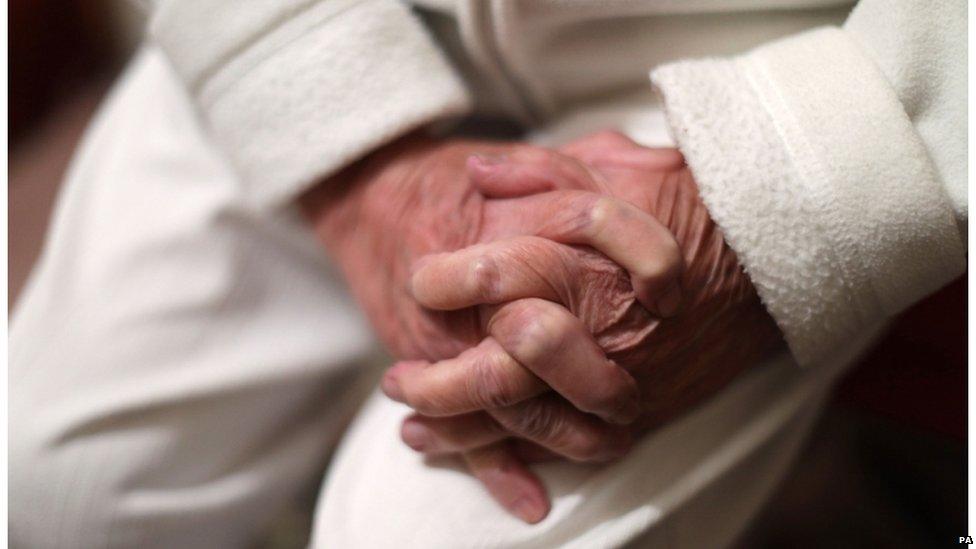
Hull's three MPs are leading a debate on social care
The Commons opens at 11.30 BST with International Development Questions followed, at noon by Prime Minister's Questions.
The day's Ten Minute Rule Bill, from the Conservative James Berry, aims to end the ability of the Lee Valley Regional Park Authority in North London, to raise a levy on the council tax charged by all London Boroughs. He says few people from his South-West London constituency ever go there.
Then MPs debate motions to approve the coming year's grants to English Police Authorities and local councils - both could be pretty contentious this time around.
In Westminster Hall, the three Hull MPs - Alan Johnson, Diana Johnson and Karl Turner - have a debate between 9.30 and 11.00 BST on changes in council funding and social care. In what I suspect will become a familiar debating subject, they aim to draw attention to the effect of changes to funding formulas on the levels of care provided and on preventative health services.
Mr Johnson accuses the government of using "smoke and mirrors" to try to suggest that local authorities don't have a problem.
Between 14.30 and 16.00 GMT, the Conservative Jake Berry will be pushing for the government to use the forthcoming Commonwealth trade ministers meeting in March to start the ball rolling on post-Brexit free trade deals with Canada, New Zealand and Australia.
In the Lords, the day's main event is the first of two Report Stage days of the Digital Economy Bill, covering such issues as online pornography and Intellectual Property.
There's also a short debate on improving standards of nutrition for women and girls globally led by the Conservative, Baroness Manzoor.

Thursday 23rd February
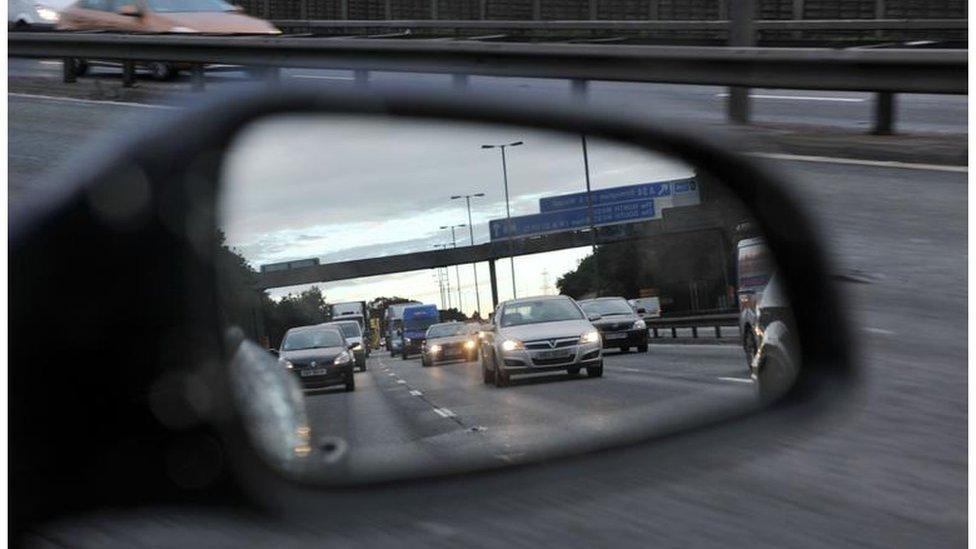
MPs will debate road accident statistics
The Commons opens (9.30am) with Transport Questions, followed by the weekly Business Statement from the Leader of the House, David Lidington, setting out forthcoming Commons debates.
Next comes an Opposition Day Debate on a subject to be chosen by the Northern Ireland Democratic Unionist Party
And that will be followed by a backbench debate on unaccompanied children in Greece and Italy
In Westminster Hall at 13.30 GMT, the SNP's Dr Lisa Cameron leads a debate on publicly accessible amenities for disabled people and at 15.00 GMT MPs will debate the Transport Select Committee's report on road traffic law enforcement. This notes that the decline in fatalities in road accidents has slowed in recent years, and the most recent annual figures show a small increase.
Look out for contributions from members of the extremely active All Party parliamentary Group on Cycling - they are conducting an inquiry of their own into the way the courts deal with accidents involving cyclists, and have noticed that the Transport Committee have highlighted the increase in injuries to pedal cyclists.
In the Lords at 11.00 GMT, as is usual as the end of the parliamentary year approaches, peers have dropped their normal Thursday backbench debates in favour of polishing off less controversial legislation.
So it's the Third Reading of the Health Service Medical Supplies (Costs) Bill - which aims to give the Government powers to cut the cost of drugs to the NHS, and it's the first Report Stage day on the Neighbourhood Planning Bill.

Friday 24th February
It's private members bill day in both the Commons and the Lords. In the Commons at 9.30 GMT, the first business is the SNP MP Dr Eilidh Whiteford's Preventing and Combating Violence Against Women and Domestic Violence Bill - which puts the "Istanbul Convention", a Council of Europe Convention, into UK law.
The convention requires countries to take action to eliminate violence against women and assume extra-territorial jurisdiction to prosecute offences, where necessary. Concerns over the technical complications involved in this have delayed ratification by the UK, since 2014.
There are a number of amendments down from the Home Office Minister Sarah Newton, while Women and Equalities committee member Philip Davies proposes that "everything in the [Istanbul] Convention will be deemed, across the United Kingdom, to apply equally to men and women".
Next comes Conservative Gareth Johnson's Awards for Valour (Protection) Bill, also known as the Walter Mitty Bill, which aims to stop people wearing medals they have not been awarded with the intention to deceive.
As I write, there are no amendments proposed for its Report Stage, and if that remains true, it should be waived through to the House of Lords with minimal delay.
There is a Report Stage amendment down for the next Bill on the agenda, Conservative John Glen's Merchant Shipping (Homosexual Conduct) Bill - which aims tidy up the law on this issue.
His Conservative colleague Chris Chope wants to make the repeal of sections 146(3) and 147(3) of the Criminal Justice and Public Order Act 1994 retrospective to the date they came into operation - effectively quashing any convictions under them.
After that, I'm not sure MPs will have much time, if any, to devote to the Second Reading of Kevin Foster's Wild Animals in Circuses (Prohibition) Bill.
In the Lords at 10.00 GMT, peers have their first debate on Bob Blackman's Homelessness Reduction Bill - now being promoted by Lord Best. The Bill will require local authorities to help single people who are homeless or in danger of losing their home, and previously didn't qualify - and it has strong cross party support, and, crucially, government backing.
Then come two more private members bills, hot from the Commons.
The Broadcasting (Radio Multiplex Services) Bill - which aims to promote digital community radio, and the Parking Places (Variation of Charges) Bill, which gives local authorities flexibility to vary parking fees, before peers get to the Conservative Lord Shinkwin's Abortion (Disability Equality) Bill, which aims to ban abortion on the grounds that the child may be disabled.
- Published7 February 2017
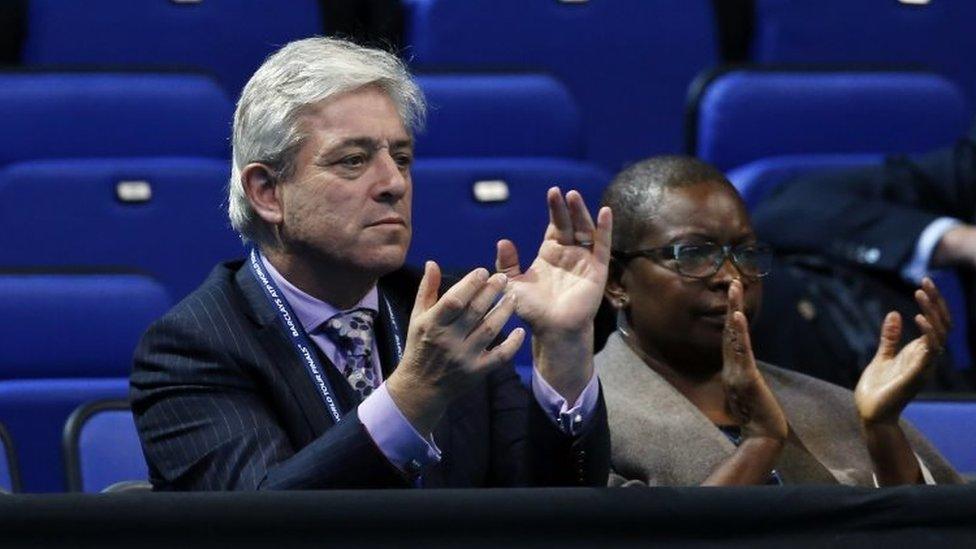
- Published6 February 2017
